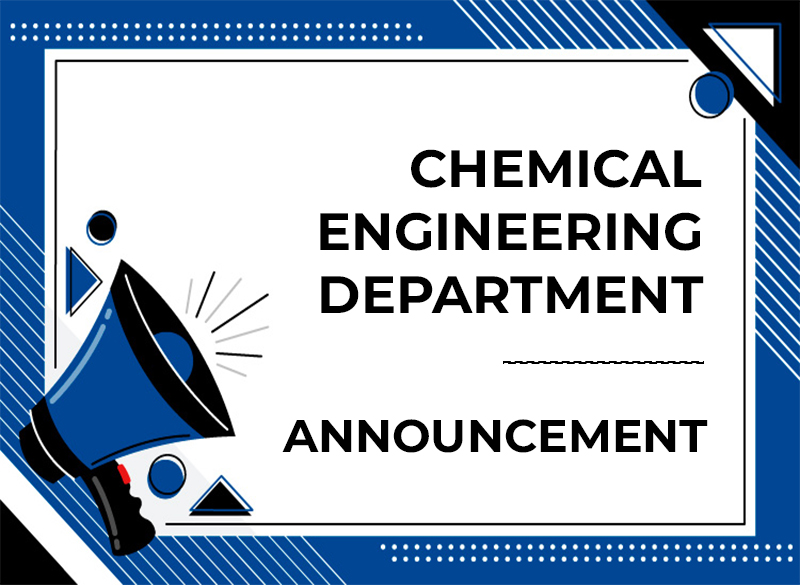CHEMICAL ENGINEERING CHBE492 ENGINEERING PROJECT TOPICS ANNOUNCEMENT- SPRING 2025

Dear graduate candidates for Spring 2025, please complete the online application form given in the following link according to your preferences for the CHBE 492 – Engineering Project topics listed below.
Applications will be accepted until February 20, 5:00 pm.
https://forms.gle/vmgYHcYbjWFRVM9P9
- Tissue Adhesives based on Polymeric Materials and Characterization Methods (Literature Survey + Experimental, 2 students) This study will involve a literature analysis on polymeric tissue adhesives as well as the application of preliminary mechanical property characterization methods for some selected materials Supervisor: Prof. Erde Can Şafak
- Smart Polymeric Materials (Literature Survey, 1 student) This study will involve a literature analysis on smart polymeric materials. For example, polymers that can change shape in response to temperature or pressure variations utilized in smart textiles and biomedical applications. Supervisor: Prof. Erde Can Şafak
- Bioconversion of biomass waste into high value chemicals. (Literature Survey, 1 student). Literature review could highlight the importance and potential of biomass waste through a biorefinery concept. The available abundance and diverse compositions of biomass waste provide potential for the production of useful chemical platforms and valuable products. Supervisor: Prof.Dr. Zoya Tuiebakhova
- Chemistry in Chemical Engineering Education. (Literature Review + Experimental, 2 students). Chemical Engineering applies chemistry, properly uses chemicals and raw materials as well as the processes that use or convert them into useful products. So, what kind of chemistry education is appropriate to prepare students for high quality and high level of chemical engineering professional life? Supervisor: Prof.Dr. Zoya Tuiebakhova
- pH-Responsive and Temperature-Sensitive Drug Carriers Literature survey, 2 students). pH-responsive drug carriers release drugs when exposed to environments with specific pH levels, and temperature-sensitive drug carriers release drugs in response to temperature variations, particularly at elevated temperatures found in inflamed or tumor tissues. The basic mechanisms behind each type of carrier will be explained. The carriers will be discussed regarding their biocompatibility, stability and efficiency. You are expected to explore how pH-responsive and temperature-sensitive drug carriers can be strategically designed to improve the precision and effectiveness of drug delivery systems. Supervisor: Dr. S. Funda Oğuz
- Integration of Arduino-Based Sensors for Automated and Real-Time Data Collection in Chemical Engineering Unit Operations Laboratory (Experimental, 1 Student) The objective of this project is to investigate the utilization of Arduino-based sensors for the automated and digital acquisition of data such as temperature, pH, and conductivity in the chemical engineering unit operations laboratory. The project aims to improve the accuracy and efficiency of laboratory operations by reducing the errors and optimizing the data collection process. For this project, at least two different Arduino-based sensors will be selected and implemented to Armfield lab-scale unit operations equipments and the relevant calculations will be made via the corresponding data acquired. Supervisor: Assist. Prof. Cem Levent Altan
- The Python-Based Libraries and Packages in Chemical Engineering Applications (Literature, 1 Student) This project aims to conduct a comprehensive literature review of Python-based libraries and packages used in chemical engineering applications. The study will explore how these software tools are applied in chemical engineering processes, their benefits, and performance evaluations. Supervisor: Assist. Prof. Cem Levent Altan
- Fuel Cell Catalyst for Heavy-Duty Vehicle Applications (Literature, 1 student) More efficient and durable cathode catalysts are needed for fuel cells to be used in heavy duty vehicles. The nature of the carbon support, Pt-alloy crystal structure, stability of the alloying element, cathode ionomer volume fraction, and catalyst-ionomer interface play critical roles in improving performance and durability. The student will investigate the total cost of ownership, development targets, degradation mechanisms of catalysts, and material approaches to improve durability. Supervisor: Assistant Prof. Dr. Levent Organ.
- Separators for Rechargeable Alkaline Zinc Batteries (Literature, 1 student) Separator membrane is an essential element within every battery system. It has a significant influence on both safety and electrochemical performance. The student will investigate the types of separators used in secondary alkaline zinc batteries, the challenges faced in development of alkaline zinc batteries such as zinc-air, NiZn, and Zn-MnO2, and approaches taken to enhance the performance of the batteries through optimization of the properties of the separator. Supervisor: Assistant Prof. Dr. Levent Organ.
- Design of Absorption Refrigeration Systems (Literature Survey + Computational, 1 or 2 Students) Supervisor: Assoc. Prof. Betül Ünlüsü
- Distillation Technology: Novel Approaches and Troubleshooting (Literature Survey, 1 student) Supervisor: Assoc. Prof. Betül Ünlüsü
- Mathematical Modelling of Fixed Packed-Bed Adsorption Columns Using a Programming Language (Literature Survey+Computational, 1 or 2 students), *Strong Mathematics Is Required , Supervisor: Asst. Prof. Hamed Yousefzadeh
- Synthesis of Amine Functionalized Metal-Organic Frameworks (Literature Survey+Experimental, 1 or 2 students) Supervisor: Asst. Prof. Hamed Yousefzadeh
- Use of Machine Learning in CO2 Capture (Literature + Computational, 2 students). Supervisor: Prof. Tuğba Davran Candan
- Screening of Multifunctional Organocatalyst Libraries for Identification of Nerve Agent Binders (Computational, 1 or 2 Students). (scholarship available for students satisfying TUBITAK’s acceptance criteria: cGPA>2.5) Supervisor: Prof. Dr. Nihan Celebi
